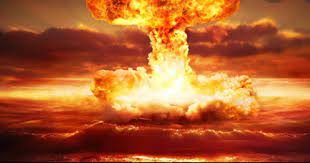Health and environmental problems linger on decades after the United States detonated 67 nuclear bombs in the Marshall Islands.
It will be the second environment-related initiative that the small island country spearheads in its two years of membership at the Human Rights Council. After obtaining the appointment of a human rights expert on climate change in September 2021, the Marshall Islands is now seeking the UN rights body’s help to address long standing human rights challenges posed by the nuclear legacy left by the United States over 60 years ago.
The pacific island is still reeling from the health and environmental effects of nuclear weapons tests conducted by the United States from 1946 and 1958, with elevated cancer rates and radiation levels in some places. Now there are fears that tons of radioactive waste stuffed two decades ago into the Runit dome could be leaking from cracks on the concrete coffin, endangering nearby marine ecosystems and neighbouring states.
The proposal, tabled last Thursday and backed by the Pacific islands of Australia, Fiji, Vanuatu, Samoa and Nauru, asks that the UN office of the high commissioner for human rights provide technical assistance to the Marshall Islands’s National Nuclear Commission in its efforts to pursue “nuclear justice” as well as “transitional justice” and submits a report to the Council in September 2024.
During informal consultations, the United States voiced its unhappiness with the proposal, according to observers, namely raising concerns around the mentioning of the right to a healthy environment. The U.S had previously expressed reservations about recognising a new right when it was successfully proposed at the Human Rights Council in October 2021.
China, the United Kingdom and Russia, which at the time had echoed the U.S’s concerns around what they saw as a too ambiguous concept, lined up too against the Marshall Islands’s proposal.
“What is incredible is the strength of the pushback, when it’s a very minimal resolution,” said Yves Lador, Geneva representative for the U.S-based EarthJustice.
The proposal was submitted under the Council’s agenda item 10, where countries can seek assistance for their own human rights difficulties. It is generally considered less antagonistic than other agenda items such as item four, where countries tend to table resolutions that specifically target countries with poor human rights records.
“Our approach has always been constructive and transparent,” said Samuel K. Jr. Lanwi, deputy representative for the Marshall Islands to the UN in Geneva. The island state repeatedly said over the last two years that it would seek to raise the nuclear issue at the council eventually. “Since we campaigned to be a member of the Human Rights Council, we always made a point to share our story.”
But the initiative still hits a sore spot. Despite efforts to make it as non-accusatory as possible, even refraining from naming the U.S directly and only referring to it as the period in which the Marshall Islands was under a UN trusteeship, the U.S’s past actions come under the spotlight.
Added to this are increasingly strained U,S relations with the region, all while China strengthens ties. An unprecedented Pacific islands summit held by the U.S last week was close to a flop, after the Solomon Islands held off until the end on signing a joint declaration vowing to deepen relations between the US and the pacific countries.
The Marshall Islands has also conveyed its frustration with what they see as the U.S’s failure to fully address their nuclear legacy, suspending talks on 23 September for renewing their Compact of Free Association, a strategic agreement that allows the U.S to have military bases in the island state territory in exchange for economic and military support, which expires in 2023.
The U.S has yet to officially recognise and apologise for the damage caused by its nuclear testing programme. While supporters of the initiative have made a point to say that the draft text does not seek reparations, they agree that it is a step that the .US should come to at some point. The initiative could also inspire other countries where nuclear tests were conducted to raise the issue at the council, observers said.
The UK conducted nuclear tests in Australia from 1952 to 1991, while the Soviet Union tested its nuclear weapons in some of its former republics, including what is now Ukraine and Kazakhstan around the same period, same as China within its territory.
It was still unclear on Monday whether the U.S would call for a vote on the proposal at the end of the week as talks to iron out any sticking points were ongoing. A European diplomat told Geneva Solutions that they were “expecting it to pass by consensus” as bilateral discussions appeared to have progressed.
SOURCE: GENEVA SOLUTIONS/PACNEWS














